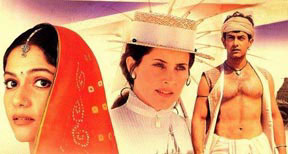|
Wearing a sparkling-white dhoti in Richard Attenborough’s Gandhi, the Mahatma’s role player Sir Ben Kingsley not only made the film an international box office hit, but also forever established the magic this traditional Indian men’s wear can weave on the silver screen.
Bollywood heroes in dhotis can not only beat up smart suit and tie-wearing villains troubling Indian damsels, they can even ride motor cycles or jump from horse back to perform any other act of ultimate chivalry. They can even win the hearts of ultra-sophisticated heroines with comfortable ease in their ancestral dresses. In Lagaan, Elizabeth (Rachel Shelly) falls head over heels for dhoti-clad Bhuvan (Amir Khan). And dhoti-sporting Shah Rukh Khan wins over hearts of every stripes in Devdas. The dhoti can be traced to the first Bollywood talkie Alamara in 1931. It baptized fame on Mithun Chakravorty in Mrigaya, although he traded it in for suits and tie subsequently in his career. Over the years, the silver screen has played hide and seek with the dhoti, featuring it on Amitabh Bachhan, screen world’s ever smiling “laughing Buddha” Govinda, Amir Khan, Shah Rukh Khan, Akshay Kumar and Anil Kapoor. Amir wears the dhoti in Sarfarosh, disguising himself as a Rajasthani gaon while trying to bust a terrorist network. Evergreen Dev Anand might now be identified with his trademark full sleeve shirt and pant, even jeans, but he performed his dhoti clad shtick in four block busters of yesteryears – Hum Ek Hai, Jeet, Age Bado and Mohan.
Bollywood’s super character artists “Dadamoni” Ashok Kumar, Raj Kapoor, Raj Kumar Guru Dutt, Dilip Kumar, Bharat Bhooshan, Rajendra Kumar and Manoj Kumar all romped through Bollywood in the dhoti. Remember Raj Kapoor driving a bullock cart with Wahida Rahman on the rustic-rural roads in Teesri Kasam chanting “sajan re jhoot mat bolo, khuda ke pas jana hai…” (darling, do not tell a lie, we have to answer for them to the god)? Or Balraj Sahni who spun magic in the early 1950’s in the dhoti in Do Bigha Zamin. Now was it Rawalpindi style or Lahore style? No matter. So who introduced the firangi dress, pant and shirt, which displaced the dhoti in Bollywood? Incredibly the man to do so, is the dhoti icon of Indian films, Ashok Kumar, who in 1941 first wore the suit in the film Naya Sansar. The dhoti trend among males ebbed around 1974-75. Indian films turned urban and the dhoti all but vanished, even though the saree stayed. But the dhoti returned with a bang around 1982 with Anil Kapoor in Ishwar, and later Who Saat Din and Virasat.
The dhoti now holds a special appeal even among NRIs, a la the success of Amrish Puri in Pardes. In Aankhen, Bollywood’s laughing Buddha Govinda successfully indulged in all sorts of pranks efficiently managing his dhoti, rousing jealosy among trouser-wearing super heroes. Dhoti zindabad!
Dhoti Rising
|
Rise And Fall Of The Dhoti

